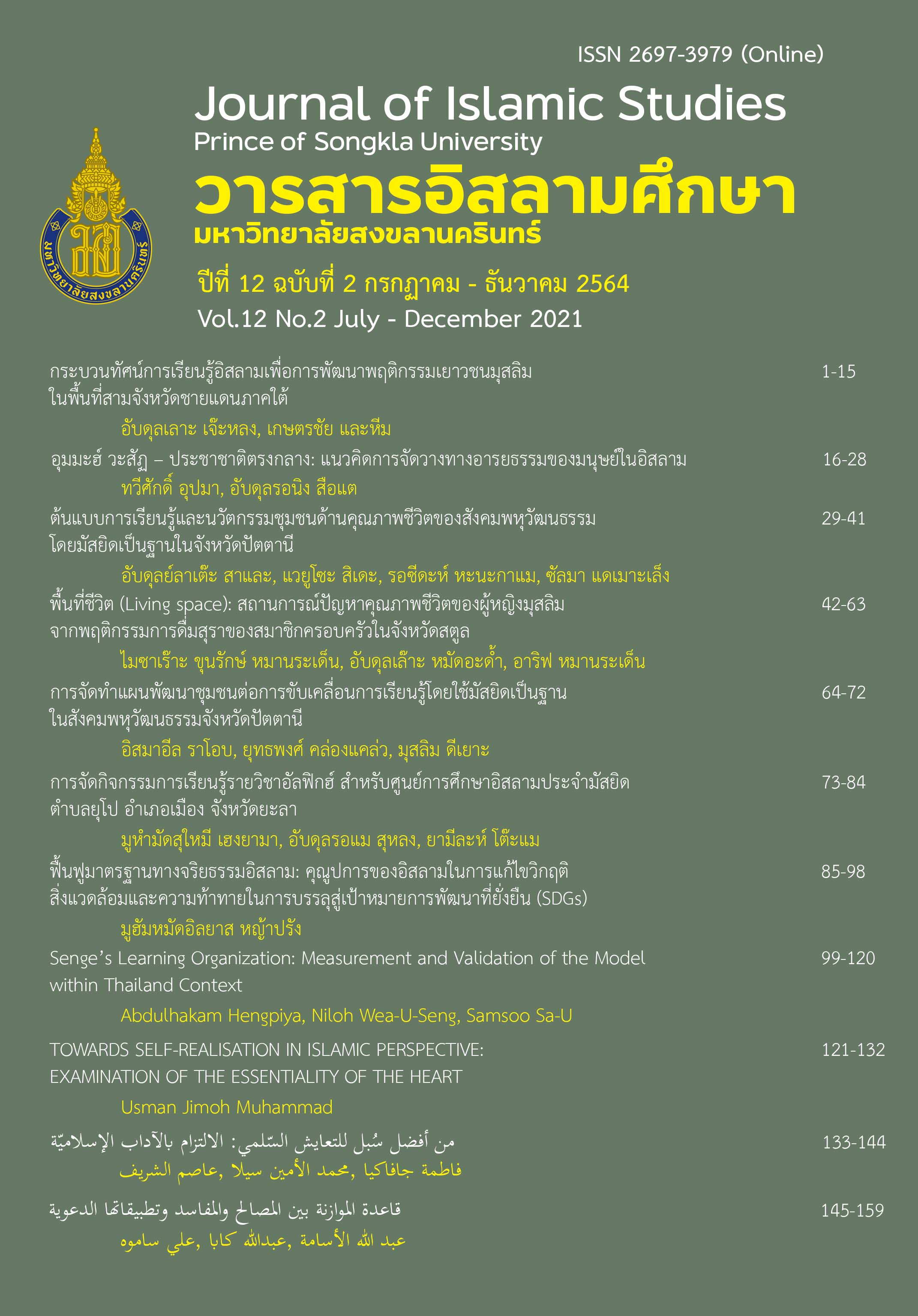The Rule of Balancing between Preventing Mischiefs and Bringing Benefits and Their Advocacy (dawah) Applications
Keywords:
balancing, mischiefs, benefits, applications, advocacy (dawah)Abstract
Objective The research aims to elucidate the concept of the rule of balancing between preventing mischiefs and bringing benefits and its legitimacy in Islam, while highlighting a number of advocacy (da’wah) applications that can be deduced from the rule.
Methodology The researchers applied the descriptive, inductive and analytical method.
Research Finding Among its most salient findings: The rule of balancing between preventing mischiefs and bringing benefits has multiple advocacy applications, some of which are related to issues of da’wah, propagator or preacher (da’i), and means of da’wah.
Applications The research contributes to clarifying the importance of paying attention to the science of legitimate purposes, especially with regard to dawah arena, and for advocacy centers and scientific institutions to make an encyclopedia of the most important contemporary dawah arena issues that overlap between preventing mischiefs and bringing benefits by dawah centers and educational institutions so that those tasked with endeavors to expresss their opinions and discuss them in multiple scientific conferences seminars and councils,.
Keywords: balancing, mischiefs, benefits, applications, advocacy
References
Abu Ajwah, Hussein bin Ahmad (2005).The jurisprudence of balancing interests and corruptions and its role in advancing the Islamic call , presented to the Conference on Islamic Call and the Changes of the Age, Islamic University, College Islamic Studies.
Abu Nasr, Ahmad Manaha, M. (1998). Al-Da’wah Al-Islamiyyah fi Thailand. A Thesis, Islamic Call College.
Abu Tawab Mustafa. (n.d.). Dawabit al-Amal bi-Fqh al-Muwazanah. Um al-Qurah: Kuliyyah al-Shariah Wa al-Adirasat al-Islamiyyah.
Abu Aziz ibn Baz. (1998-1419). Fatih al-Bari bi-Sharih Sahih al-Bukhari, Li-ibn Hajar. Dar- al-Hadith.
Ahmad, Ibrahim Ibn Ali. (1434). The jurisprudence of balances in the call to God. Presented at the conference on the Jurisprudence of Balancing and its Role in Contemporary Life. Umm al-Qura University.
Al-Aroor, Adnan bin Muhammad. (2005). Advocacy approach in the light of contemporary reality. Prince Nayef Al Saud International Prize.
Al-Bukhari, Muhammad Ibn Ismael. (1417). Sahih al-Bukhari. Dar al-Salam.
Al-Bukhari, Muhammad bin Ismail. (1422). Sahih Bukhari. Investigation: Muhammad Zuhair bin Nasser Al-Nasser. Dar-tawq alnaja.
Al-Raghib al-Isfahani. (1998). Vocabulary in the strange Qur'an. Arranged by: Muhammad Khalil Itani. Dar-al marifah.
Ali Mahama Samo. (1433). Al-Madariss al-Islamiyyah fi-Janub Thailand wa-Dauruha fi-al-Dawat Ila Allah. PhD Thesis, Kuliyyah al-Da’wah wa-Usul al-Din, al-Jami’ah al-Islamiyyah.
Al-Nawawi, Yahya bin Sharaf. (1393). Al-Minhaj Explanation of Sahih Muslim bin Al-Hajjaj. Dar Ihya al-Turath al-Arabi.
Al-Naysaburi, Muslim bin Al-Hajjaj. (n.d). Sahih Muslim, investigation: Muhammad Fouad Abd al-Baqi. Dar Ihya al-Turath al-Arabi.
Al-Saadi, Abdul Rahman bin Nasser. (1424). Facilitate the Holy Rahman in the interpretation of the words of Mannan. Investigation: Abdul Rahman bin Mualla Al-Luhaiq. Ministry of Islamic Affairs.
Al-Ezzu Ibn Abd Salam. (1980-1400). Qawa’id al-Ahkam fi Masalihi al-Anam. Al-Jil.
Al-Thubaiti, Abed bin Abdullah. (1428). Rules and controls of the jurisprudence of advocacy according to Sheikh Al-Islam Ibn Taymiyyah. Dar-Ibn aljawzi.
Asman Ti Ali. (2010-2011). Al-Huquq al-Siyassiah li al-aqliayh al-Muslimah fi JunubThailand: Dirasah Tahqiqiyah fi al-Shari’ah al-Islamiyyah. Ph.D Thesis, IRK, IIUM.
Ibn Hajar (1328). Al-Isabah fi Tamyiz al-Sahabah. Dar Ihya’ al-Turath al-Arabi.
Ibn Hajar,Ahmad bin Ali. (1379). Fath Al-Bari Explanation of Sahih Al-Bukhari. Correction and supervision: Moheb Al-Din Al-Khatib. Dar-al marifah.
Ibn Hanbal, Ahmad. (1999). Al-Musnad. Investigation: Shuaib Al-Anawut and others. (2nd. ed.) Al-Risalah.
Ibn Kathir, Ismail bin Omar. (1999). Interpretation of the Great Qur'an. Investigation: Sami bin Muhammad Salama. Dar Taibah for Publishing and Distribution.
Ibn Taymiyyah, Aḥmad ibn ʿAbd al-Ḥalīm. (1420). integrity. Investigation: Muhammad Rashad Salem. Dar-ibnhazm.
Ibn Kathir. (n.d.). Tafsir al-Quran al-Azhim (6th ed.). Library of Science and Governance.
Jamal Saltan. (1992-1413 H). Fiqh al-Khilaf Madkhal Ila Wihdah al-Amal al-Islami. Islamic Center.
Makhdoom, Mustafa. (1420). Means Rules. Dar-eshbelia.
Muhammad Ibn Issa al-Tarmiz. (1417 H). Al-Sunan. Sheik Salihi Ibn Abu Aziz al Shiek (Ed.) Dar al-Salm.
Muath Muhammad. (n.d.). Al-Qawa’id al-Nathariah wa-Tatibiqatuhah al- Amaliah l-Fiqh al-Muwazanat. Conference research papers, Kuliyyah al-Shariyyah al-Islamiyyah wa al-Dirasat al-Islamiyyah, Jami’ah Umm al-Qurah.
Samoh, Ali. (2020). The gorgeous masterpiece in the landmarks of moderation. Pattani Press.
Uthaymeen, Muhammad ibn al-Salih. (1997). Explain three assets. Prepared by: Fahd bin Nasser Al-Sulaiman. Dar Al Thuraya.
Youbi, Mohamed Saad. (1998). The purposes of Islamic law and its relationship to legal evidence. Dar alhijrat lilnashr waltawzie.
Zidane, Abdul Karim. (1987). The origins of the call. (3rd. ed.). Dar-alwafaa.
Downloads
Published
How to Cite
Issue
Section
License
Copyright (c) 2021 Journal of Islamic Studies, Prince of Songkla University

This work is licensed under a Creative Commons Attribution 4.0 International License.
All articles Published in The Journal of Islamic Studies are author’s opinions, and not the responsibility of the Faculty of Islamic Sciences nor the editorial board. However any citation should be referred to the journal.
















